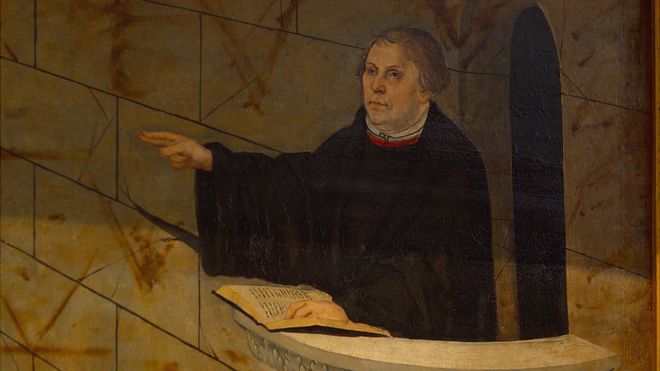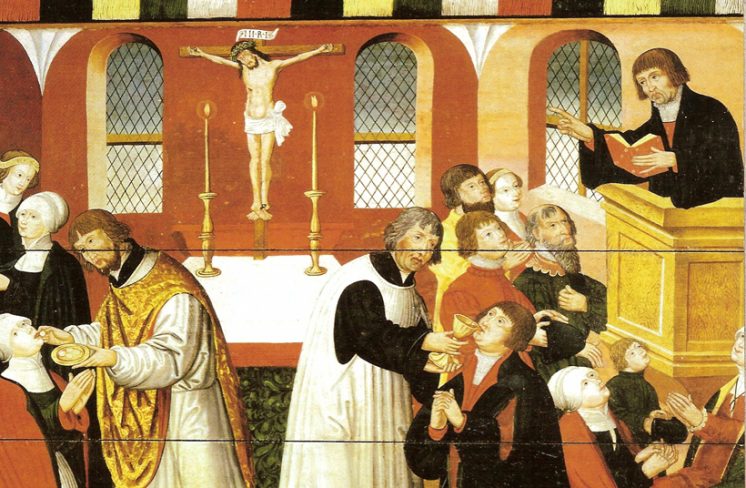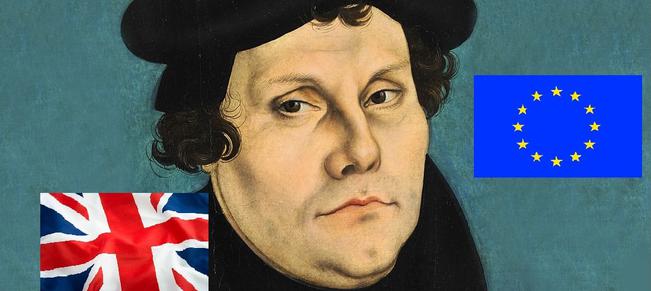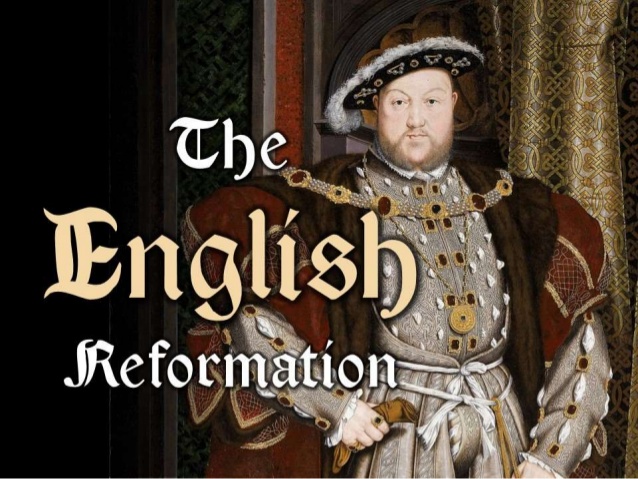'The 500th anniversary of Lutheranism will pass unmarked in Britain. But it left a toxic and destructive legacy’

Martin Luther began the Protestant Reformation 500 years ago
Photo:bbc.co.uk
Giles Fraser:‘Brexit recycles the defiant spirit of the Reformation’

Martin Luther Preaching to Faithful, 1561, artist unknown
Photo:idler.co.uk
‘...it’s 500 years since the start of the Reformation. On 31 October 1517, Martin Luther nailed his 95 theses to the door of All Saints, Wittenberg, targeting corruption at the highest levels of the church. The scandal of which he complained was the sale of forgiveness to finance an ecclesiastical gravy train and lavish building projects such as that of St Peter’s in Rome. From here the Reformation would spread out to become an across-the-board protest at the elitist and centralising philosophy of the Roman church. Here also we find the intellectual roots of Euroscepticism.
…’Research by social scientist Margarete Scherer from the Goethe University in Frankfurt has demonstrated a considerably higher prevalence of Euroscepticism in traditionally Protestant countries than in traditionally Roman Catholic ones. And this should be entirely unsurprising, given that the Reformation was largely a protest about heteronomous power. “The bishop of Rome hath no jurisdiction in this realm of England” goes the 37th of the 39 articles of religion, still – officially, at least – a summary of the theology of the Church of England, of which the Queen is supreme governor.’...Continue to read
Martin Kettle: ‘How the Reformation sowed the seeds of Brexit’

Photo:premierchristianity.com
Five hundred years after he challenged the authority of the papacy by nailing his 95 theses to the door of a church in Wittenberg, Germany, Martin Luther no longer means much in the UK, this still supposedly Protestant country. The anniversary of Luther’s historic act of defiance on 31 October will pass mostly unremarked, certain to be eclipsed by the autumn trashfest that is the Americanised version of Halloween.
These days, the name Luther is more likely to invoke a TV detective series starring Idris Elba than the monk from a Saxon coalmining family who rocked Europe to its core half a millennium ago. The words Martin Luther are more associated with the great American civil rights leader than the man after whom Dr King was named.
To be fair, these islands have never had a mainstream Lutheran tradition like that in continental northern Europe or, later, north America. But the Reformation that Luther set in train absolutely had an effect here. In its English guise, it had a place for both freedom of worship and doctrinal strictness, humanism alongside sectarianism. It could be very cruel.
But at the centre of the English Reformation was England itself. The Reformation enabled early modern England to become, culturally and politically, the country that in important respects it still is. Protestantism was one of the foundation stones of the British state that evolved over subsequent centuries – and formally it still holds up the edifice of state today.’...Continue to read
Roy Hattersley: ‘The Reformation should have been a warning to Remainers’
‘If David Cameron had understood the causes and progress of the English Reformation he would have realised the appeal of ‘very well then, alone’

Photo:bing.com
‘We are told that, shortly after midnight on 24 June, 2016, when the European Union referendum result was declared, David Cameron and George Osborne – the true begetters of the squalid exercise in party management – were as surprised as they were disappointed. That was because they did not understand the character of the English people. They took it for granted that votes would be cast according to a calculation of whether membership of the European Union or withdrawal offered England the most prosperous future. But inhabitants of this fortress built by nature do not live by GDP alone.
Many of them have an ingrained belief in national sovereignty. England is at its best, the argument runs, when it is neither governed nor influenced by decisions taken in what Shakespeare called “less happier lands”. If Cameron and Osborne had understood the causes and progress of the English Reformation they would have realised the appeal of “very well then, alone”. The parallels are far from exact, but they are near enough to prove that the English believe in deciding things for themselves.
Although there was no accession treaty, the church in England took a formal decision to affiliate to the Church of Rome. At the Synod of Whitby in 664, the assembled clergy of Northumberland – a far larger area than the modern county – decided to adopt the Roman liturgy and the Roman calendar.
The rest of England followed suit and the unified Catholic Church was created. It remained happily subservient to Rome for nearly 900 years – rather longer than Britain maintained its allegiance to the Common Market that became the European Union.’...Continue to read
